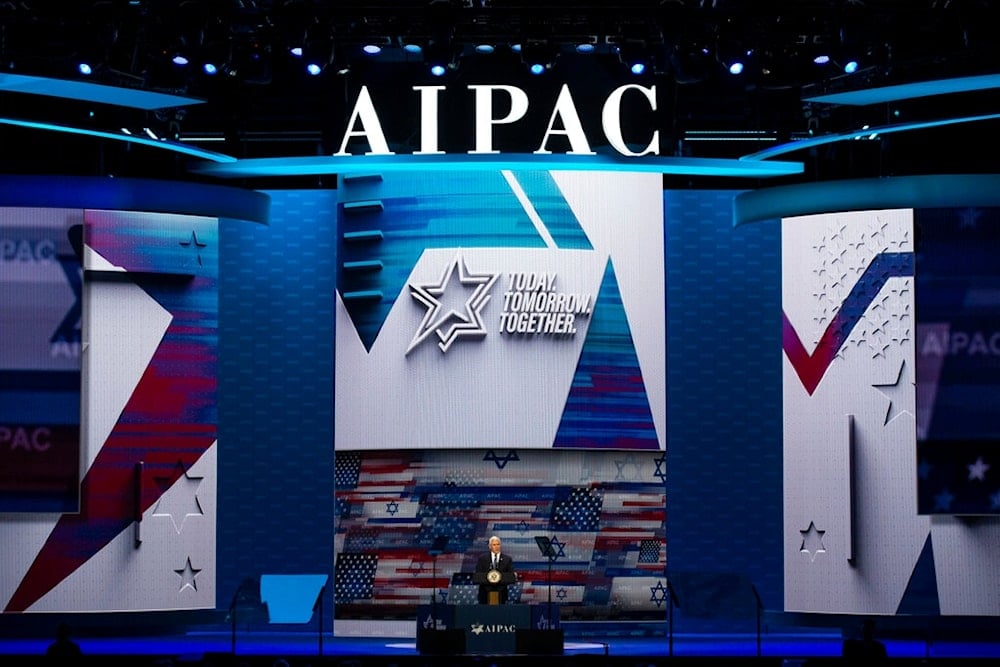Ex-AIPAC-funded lawmakers back bill to halt US weapons to 'Israel'
Several House Democrats who once accepted AIPAC funding are now backing the Block the Bombs to Israel Act.
-

Former Vice President Mike Pence speaks at the American Israel Public Affairs Committee (AIPAC) 2020 Conference, Monday, March 2, 2020, in Washington, DC (AP)
The Intercept on Wednesday reported that three House Democrats who previously received significant campaign contributions from the American Israel Public Affairs Committee (AIPAC) have joined as co-sponsors of legislation that seeks to block US arms sales to "Israel," reflecting shifting political dynamics as "Israel's" war on Gaza continues.
The Block the Bombs to Israel Act would prevent the Trump administration from transferring US-made weapons linked to documented war crimes against Palestinians. With the 2026 midterm elections approaching, its supporters are framing the bill as a test for Democratic candidates amid widespread voter frustration with US complicity in "Israel's" actions.
A break with AIPAC funding
Rep. Valerie Foushee, D-NC, who benefited from more than $800,000 in AIPAC donations during her first campaign in 2022, signed onto the bill on August 6 and pledged the following day to reject further funding from the lobby group during the upcoming cycle. "Look, you may have given money to my campaign, but I am taking a stance that is correct," said the bill's lead sponsor, Rep. Delia Ramirez, D-Ill., praising her colleagues' decision.
Other co-sponsors include Rep. Veronica Escobar, D-Texas, who received $46,000 from AIPAC in 2022, and Rep. Jonathan Jackson, D-Ill., who took $15,000 across the 2022 and 2024 cycles. At a weekend town hall in El Paso, Escobar said, "I had AIPAC support early on in my elected life. I do not receive AIPAC support, it's been years," stressing her support for the legislation.
Originally introduced in June with 12 co-sponsors, the bill now counts 37 backers, among them prominent progressives and Jewish lawmakers such as Reps. Sara Jacobs, D-Calif., and Jan Schakowsky, D-Ill. The expansion coincided with Congress's summer recess, when representatives faced heightened pressure from constituents demanding an end to US military aid.
Constituent pressure, grassroots anger
Beth Miller of Jewish Voice for Peace Action noted that the political landscape is shifting as lawmakers encounter anger at home. "When senators went home, if they voted the wrong way, they were getting angry outreach from their constituents about ‘Why would you have tried to continue sending bombs to Israel?'" she said.
The developments also spotlight AIPAC's enduring influence. In Missouri, Rep. Wesley Bell, who defeated incumbent Israel critic Cori Bush after the lobby poured $8 million into his campaign, faced fierce criticism at a St. Louis town hall. Protesters denounced his record with chants of "Wesley Bell loves killing children" and "Wesley Bell loves bombs and rockets." While Bell issued rare criticism of "Israel" in July, he defended AIPAC at the event, dismissing accusations against it as "propaganda."
AIPAC’s enduring influence
Criticism has also emerged from constituents of lawmakers like Rep. Jacobs, who questioned why the legislation excludes defensive systems such as the Iron Dome. Ramirez acknowledged such concerns, saying she aimed to draft a measure that could both hold "Israel" accountable and build a broader coalition.
Activists backing the bill, including the US Campaign for Palestinian Rights and IfNotNow, described it as part of a longer-term effort to end US complicity in "Israel's" war. "The pro-Israel lobbying institution is being dismantled a bit at a time; it's not as powerful as it once was," said Iman Abid-Thompson.
Read more: Half of Americans say 'Israel' has too much US influence: Poll
Still, AIPAC's resources loom large ahead of the 2026 elections, and groups like IfNotNow argue that only strong grassroots mobilization can counter its influence. "What it takes to beat their money, or what it takes to beat any right-wing-billionaire-backed money, is a massive turnout," said Lauren Maunus. "And to win massive turnout, you actually need to like fight for things and not just be running a middle-of-the-ground, tepid, scared campaign."

 4 Min Read
4 Min Read










